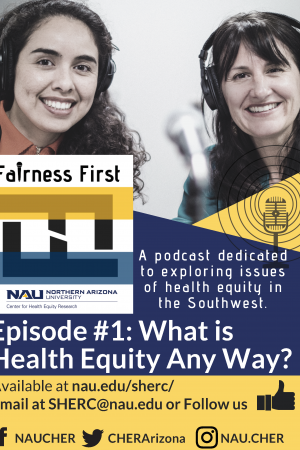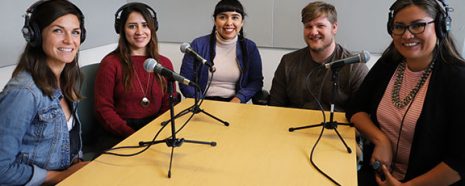 What is health equity, anyway? Researchers from Northern Arizona University’s Center for Health Equity Research (CHER) are helping listeners to find out through a new podcast series “Fairness First.”
What is health equity, anyway? Researchers from Northern Arizona University’s Center for Health Equity Research (CHER) are helping listeners to find out through a new podcast series “Fairness First.”
The podcast is part of the Community Engagement Core (CEC) of the Southwest Health Equity Research Collaborative (SHERC), which is a grant initiative under CHER. One of the objectives of SHERC is to work with the local community about health equity matters.
“The overall goal of the Community Engagement Core is to develop innovative tools and methods of dissemination to build more collaboration with the community,” said Alexandra Samarron, a senior program coordinator with CHER and one of three Fairness First podcast hosts.
In the first episode, Samarron interviews “Olga,” a Flagstaff resident who has experienced housing inequality issues and lost her rental home. With Samarron translating Olga’s Spanish, the host describes how Olga was evicted and began experiencing headaches and other stress-related issues due to losing her home.
Samarron also talks to Julio Quezada, manager of North Country Health Care Integrated Clinic, Darrell Marks, an academic adviser at Flagstaff High School dedicated to working with American Indian students, and Samantha Sabo, the CEC co-lead and an associate professor of health sciences at Northern Arizona University.
“It has been a learning process with how to conduct interviews, especially since I hosted the first episode,” Samarron said. “I am starting to feel more comfortable with talking on the mic.”
The researchers partnered with Northern Arizona University’s Media Innovation Center to help with the podcast recording and editing. They designed the episodes’ structure with Brian Rackham, an associate professor in Northern Arizona University’s School of Communication. Aldric Meints, a student in the communication department, recorded and edited the episodes.
“Brian has been very helpful in guiding us in the process,” Samarron said. “He also introduced us to Aldric, who helped us with thinking about the interviews and all of the technical parts that were challenging to learn.”
The group plans to release two more episodes this semester. In the next episode, Kelly McCue, a senior program coordinator with CHER, will interview CHER students in the master of public health indigenous health track at Northern Arizona University. Carmenlita Chief, a senior program coordinator with the CHER, will host the episode that features SHERC’s Community-Campus Partnership Support (CCPS)—a program that partners community practitioners and leaders with university investigators.
Chief said that she thinks exploring health equity will be helpful to listeners.
“Storytelling is an essential part of our work as public health advocates because it’s a personal and meaningful way of communicating information,” Chief said. “In a previous chapter of my life, I was a journalist so I loved the aspect of being back in my creative element and crafting narratives that make research relatable to a broader audience.”
 Mc Cue said she hopes the podcast will help northern Arizona learn more about the center’s work to promote health equity in the region.
Mc Cue said she hopes the podcast will help northern Arizona learn more about the center’s work to promote health equity in the region.
In addition to the Fairness First, the group is also developing a video series and a webinar that highlights a few SHERC health equity programs with partnerships in the community.
“We also hope to really challenge more researchers to start thinking about building relationships in the community and to start thinking about how their science needs to be more applicable to community needs,” Samarron said.
The podcast is available on iTunes and also on the SHERC website.